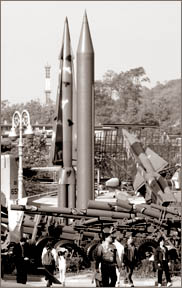|
observer |
|
|
|
|
|
OTHER LINKS |

|

|

|
How can U.S. guard its nuclear plants?Making nuclear power plants impervious to an airliner attack by terrorists is impracticable, and it's up to the military to avert such an assault, the government said Monday.
The Nuclear Regulatory Commission, in a revised security policy, directed nuclear plant operators to focus on preventing radiation from escaping in case of such an attack and to improve evacuation plans to protect public health and safety. "The active protection against airborne threats is addressed by other federal organizations, including the military," the NRC said in a statement. The agency rejected calls by some nuclear watchdog groups that the government establish firm no-fly zones near reactors or that plant operators build "lattice-like" barriers to protect reactors, or be required to have anti-aircraft weapons on site to shoot down an incoming plane. The NRC, in a summary of the mostly secret security plan, said such proposals were examined, but it was concluded that the "active protection" against an airborne threat rests with organizations such as the military or the Federal Aviation Administration. It said that various mitigation strategies required of plant operators, such as radiation protection measures and evacuation plans, "are sufficient to ensure adequate protection of the public health and safety" in case of an airborne attack. Sen. Barbara Boxer, D-Calif., said that NRC appears not to have followed the direction of Congress "to ensure that our nuclear power plants are protected from air- or land-based terrorist threats" of the magnitude demonstrated by the Sept. 11 attacks. The NRC "has missed an opportunity to provide the public with a real solution to the nuclear reactor security problem," said Rep. Edward Markey, D-Mass., a critic of the nuclear industry and the NRC. Daniel Hirsch, president of the Community to Bridge the Gap, a California-based nuclear watchdog group that had urged the NRC to require physical barriers to keep planes from hitting reactors, called the security measures "irresponsible to the extreme." "Rather than upgrading protections, [the NRC plan] merely codifies the status quo, reaffirming the existing, woefully inadequate security measures already in place at the nation's reactors," he said. |










